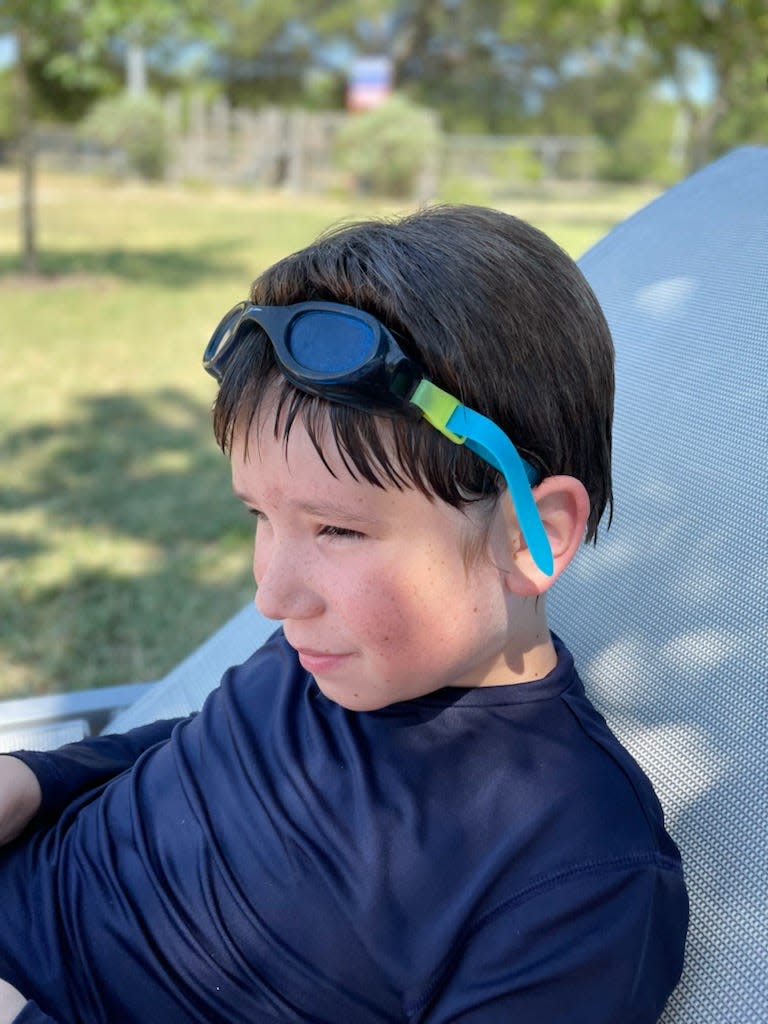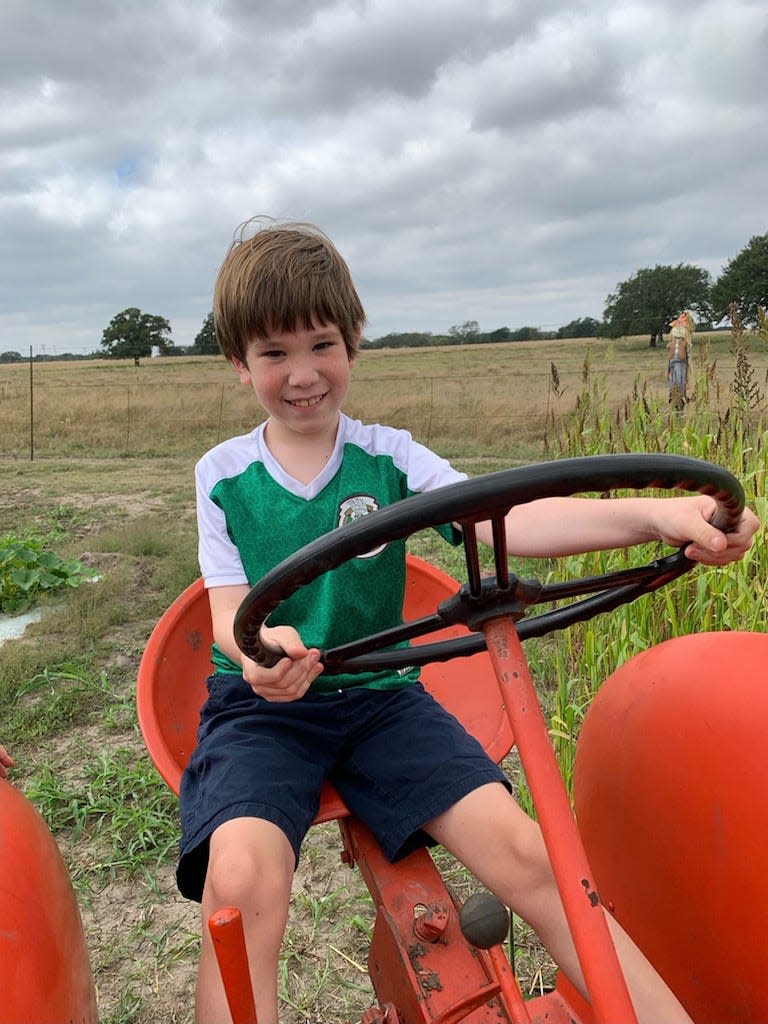For kids difficult to diagnose, Dell Children's autism team finds answers
When James Byrne-Martinez was 4, his preschool and his parents noticed that he had a speech delay and he didn't seem to be following instructions. He also was a sensory seeker — meaning he just had to touch things.
"Taking him to a grocery store, he would run his hand on rows of glass bottles," said his dad, Kevin Byrne. "It was a nightmare."
Yet James' primary care physician wasn't overly concerned. He was diagnosed with a sensory processing disorder, but that was it.
The family lived in Arizona at the time. When they moved to San Marcos and James starting attending first grade, his teacher thought it was something more. She thought he should be tested for autism.
Understanding autism: Teen shares his journey from not being able to communicate to writing poetry and music

For mom Ana Martinez, the suggestion brought relief. She had wanted to do further testing for a while.
"It was all very confusing," she said. "We were trying to figure out things, trying to find the right diagnosis. Is it diet? Is it corrective? There was a lot of anguish over that."
The family took James to the comprehensive autism team at Dell Children's Developmental Behavioral Pediatrics to have him evaluated.
The team includes developmental and behavioral pediatricians, psychologists, social workers, specialists in psychological testing, and speech therapists. It specializes in kids like James, who are more difficult to diagnose. The team spends the day doing observations, parent interviews and psychological testing.
Often the kids are age 4 and younger. The team likes to see children as young as possible for early intervention, but they do see kids as old as 14.
Referrals often come from pediatricians. But they also come from neurologists who haven't been able to make a definitive diagnosis, as well as from nonprofit early childhood intervention programs, such as Any Baby Can and Easter Seals.
"We take the more challenging cases," said Dr. Sheri Ravenscroft, a developmental and behavioral pediatrician. "The difference is the evaluation we provide."
The team meets to make the diagnosis and sort through diagnostic dilemmas. Sometimes there can be more than one diagnosis and additional testing to be done. They work closely with genetics and neurology to rule out other conditions that could be causing the behaviors.
That means the outcome isn't always an autism diagnosis. Sometimes entirely different conditions are uncovered.
Because of the comprehensive approach, wait times for new patients have been cut by almost 14 months, from what previously was more than two years for testing and diagnosis. Two years without diagnosis and treatment can make a huge difference in outcomes because of missed therapy opportunities.
The testing gets filed with insurance, which can save families $3,000 or more in out-of-pocket expenses.

Getting to diagnosis: Could your eyes reveal ADHD or autism? Austin doctors intrigued by new research
It starts with the diagnosis
"We say that diagnosis is just the tip of the iceberg," Ravenscroft said.
That's because the team also helps families figure out what the diagnosis means and how to understand it and their child's behaviors.
Social worker Caroline Turner likes to enroll parents in the Autism 101 program, a six-week group program with one 90-minute session per week.
The program is aimed at providing parents with a better understanding of how their child's brain works, as well as helping them navigate available resources and comprehend terminology. It also teaches intervention measures that can be used at home.
In addition, Turner said she includes a whole session on self-care for parents. "I get the eye-roll," she said. "It's like, 'really?' At the same time, this is really important. They have to take care of themselves."
The social work team connects parents to resources near them, including different therapies and support. The team follows up regularly to see what new resources might be needed, or what support their child needs at school.
On the medical side, Ravenscroft said she oversees medical management to help with sleep, mental health dual diagnoses or behaviors.
More care: JoyRx Music brings music lessons to the doctor's office in Austin
Living with the diagnosis
For James' family, the diagnosis brought an end to the confusion.
"All the pieces fell into place," Byrne said. "James' personality made sense more — who James is."
For Martinez, working with Turner and going through Autism 101 was really key to understanding her son and building a community. "I'm not saying it was easy, but the whole world opened up," Martinez said.
The team's support has been helpful, Byrne said. After diagnosis, "100,000 questions land on you." Team members, he said, "know what they're talking about and how to talk to totally freaking out parents."
Byrne, for instance, wanted to know what the diagnosis meant for James as a child but also "what does it mean for him when he's 40?"
Advocating: How one boy with autism and his parents found an education online
They learned the trajectory for James would be different than they originally thought. "James is going to be on a different path," Byrne said.
Autism 101 also helped the family figure out how to have conversations about James' autism with him, with his younger sister and with extended family.
Today, James is 9 and loves video games and reading graphic novels. He loves everything Mario — Mario video games, Mario bedsheets, Mario shirts, Mario backpack, Mario curtains. "If you get him talking about it, it will be a two-hour conversation," Byrne said.
His parents have learned a lot about how to give him transition times between tasks, anticipate behaviors, and talk through events before they happen. When it comes to social experiences, like trick-or-treating or visiting Santa, "He doesn't have to do everything," Martinez said. "We don't force him. We don't think things need to be done."
They ask themselves "what is he feeling? We put ourselves in his shoes," Byrne said.
"We parent with a lot of patience," Martinez said.
They follow their mantras: Choose your battles. Be prepared. Break things down one thing at a time.
They have fully incorporated autism into their lives. Even James' younger sister will remind people, "James needs more time. He's autistic."
She's even asked, "Why am I not autistic?" She sees it as a positive thing, Martinez said: "We took that from Autism 101."
Parenting resources: Feeling alone in parenting a kid with mental illness?
This article originally appeared on Austin American-Statesman: Dell Children's autism team helps make difficult diagnoses in Austin

